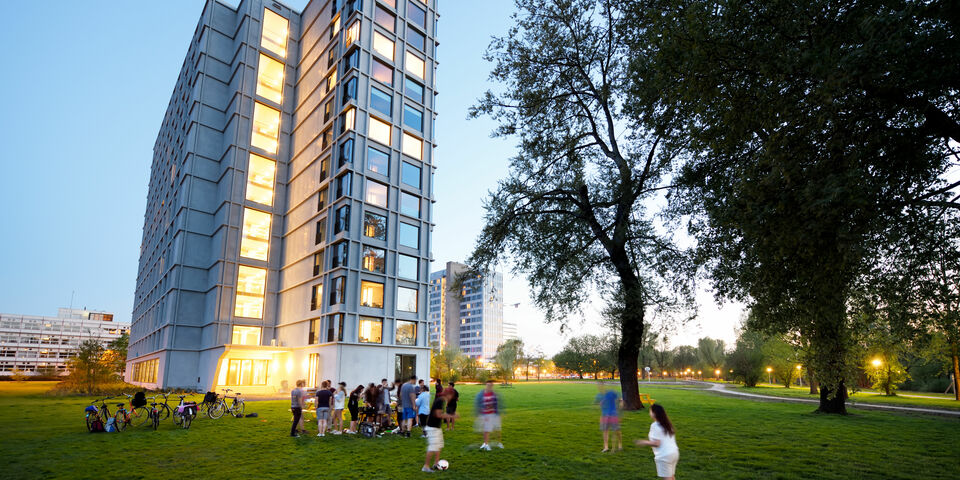“TU/e needs to open up campus for more housing accommodation”
Niels Groot, council member for Christian democratic party CDA, wants TU/e and Fontys to take responsibility for the housing accommodation of their students. Both institutions need to make locations available on their campuses for housing units in the short term. Groot said this during Tuesday evening’s council meeting in which the new rules for room rental and split homes were discussed. Next week, a majority of the council will probably vote in favor of the rules, which are meant to reduce nuisance caused by room rental.
Niels Groot explains what he meant to say exactly with his call during the debate in the council meeting last Tuesday evening, and how it, laid down in a motion this time, will be taken into account when the council officially casts its vote on the new rules next Tuesday. “What I argue is that the negotiations between the municipality and TU/e and Fontys will be intensified in the short term, in order to find out what possibilities there are for building student homes on the campuses of both institutions.” Groot says that the possibilities for building student homes in the city of Eindhoven are practically exhausted, and that it is therefore important to see whether TU/e and Fontys can be of help in this regard.
“To be clear, I don’t want them to draw on their financial reserves to build and operate accommodations, but I do want them to make locations available. Other parties will then be given the opportunity to build there. The municipality’s so-called Red Carpet approach needs to ensure that this will go through all the official administrative channels as quickly as possible.” Groot expects support for his motion: "My faction, the CDA, certainly isn’t the only party that will support this motion”.
Starter homes
Groot says that he understands how important the increasing inflow of Dutch and foreign students is to businesses in the Brainport region, but he warns that the rent increase will soon lead to a situation in which there will be no more available starter homes for graduates in the city. Groot: “If it’s possible to build a number of the required student rooms on the campuses now, the municipality will be able to prevent the room rental agencies from stealing away starter homes from the housing market. Otherwise, there won’t be any affordable homes left, and students will move to another city after their graduation. And surely we don’t want that either?”
Extra effort
The fact that TU/e has been offering over 750 housing units on its campus in recent years did not go unnoticed by Groot as well, “but I still think that we need to make an extra effort in this regard. The city creaks under the weight of housing shortage, and I believe there are more than enough smart people at TU/e who can come up with creative ways to realize still more housing units on campus.”
In late March, TU/e’s vice president Nicole Ummelen informed the university council that the Executive Board is investigating whether it is possible to build a third residential tower on campus within the foreseeable future. At the time, Ummelen said that the university is already talking to several external parties, but that such a project needs a lead time of at least three to four years.
And one year ago exactly, construction company Hurks Vastgoed announced its plans for the construction of a residential, work and learning complex on the TU/e campus, on the side of the Kennedylaan. This would involve an investment of close to a 100 million euros, according to Hurks.
About the 30-meter rule, ‘closed neighborhoods’ and permits
On Tuesday, November the 19th, the city council of Eindhoven discussed the new rules for room rental and split homes. The issues under discussion included the so-called 30-meter rule, ‘closed neighborhoods’ for which the municipality no longer issues permits for room rental and the splitting of homes, and the question of what should be done with old and/or incomplete permits.
Socialist party SP was the only party that also wanted to stick to the 10-percent rule, on top of the 30-meter rule. That would mean that no more than one in ten homes can be rented out as a room or floor per street. Responsible alderman Yasin Torunoglu of social democratic party PvdA believes that the current set of rules already provides the neighborhoods with adequate protection. According to him, the 10-percent rule does not add anything extra. Torunoglu said that he wanted to take position in the middle of the wide range of interests. “We are looking for balance. We want to spread the nuisance across the entire city, so that it doesn’t just affect the vulnerable neighborhoods. And we want to realize sufficient housing capacity for new citizens of Eindhoven.”
The alderman wanted to address the concerns over the transitional regulation. Should it be implemented literally in the three areas where new buildings with student rooms are not welcome, it would mean that many of the landlords who were tolerated until now will have to close down. Result: many students will be out on the street. Torunoglu says that the transitional regulation – owners have one year to apply for a permit based on the old rules – will first be carried out in the rest of the city. After that, the implementation of the rules in the neighborhoods Bennekel, Doornakkers and Woensel West will be further looked into. “We primarily want to tackle the problems caused by buildings from illegal landlords. The well-meaning landlords really have nothing to fear.”



Discussion